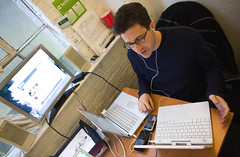 I am a self-proclaimed numpty when it comes to multi-tasking. If I am facilitating in a webinar and have to focus on tweaking something I have to ask everyone to be patient as I can't speak and read/click the correct buttons :-)
I am a self-proclaimed numpty when it comes to multi-tasking. If I am facilitating in a webinar and have to focus on tweaking something I have to ask everyone to be patient as I can't speak and read/click the correct buttons :-)Well, it turns out that this is not unusual. This research conducted by a Stanford professor, Clifford Nass, into multi-tasking indicates that the practice is detrimental to thinking deeply and remaining focussed. I wonder though if a more sophisticated notion of multi-tasking is needed (or maybe it's in the research and I've missed it). When I'm pulling together ideas and concepts that will inform a paper I'm writing I'll often listen to podcasts, watch a video, flick through magazines, ask questions via Skype/Facebook about my peers' thoughts, highlight books with relevant quotes and so on. I guess I'm not trying to do all at the exactlythe same time, but I will often pause one resource to flick across to another to check something, and then move on to something else. I think the difference might be, at the center of all this is a focus - the development of a concept. And the ideas are all collated into a central space that helps guide the process and add structure to the ideas I'm developing.
I wonder if that is what some learners are sometimes doing when they are apparently not focussed (and note that the example is "teachers trying desperately -- mostly failing -- to control the level of multitasking in the classroom. But it seems like mostly a losing battle" [my emphasis]. Could it be that the learners are distracted because the 'stand and deliver' approach so often used really isn't engaging them?
Just some musings. It's sometimes easy to jump onto 'technology in the classroom is just a source of distraction' bandwagon, without reflecting on what else is (or isn't) going on in the environment. Would be great to hear your thoughts.
To read an interview with Clifford Nass who speaks about the implications of his research, please click here. And as a taster:
We know that there are a few things humans can do at the same [time], two things at the same time our brains can do, but not any of the things we think about as multitasking. So your brain can use two words at the same time. So if someone's speaking to you, and someone else is speaking to you, we can listen to both at the same time; if you're reading and someone's talking to you. In the case of music, it's a little different. We have a special part of our brain for music, so we can listen to music while we do other things. But in general, no, our brain can't do two things at once. [my emphasis]
ImageNantek multitasking by Thomas Hawk
Related articles
- ADHD, Multi-Tasking, and Reading (danapress.typepad.com)
- Multitasking Isn't Real (adhdpursuitoffitness.wordpress.com)
- Risky Multitasking Statistics - Digital Stress Infographic Reveals Consequences of Juggling Tasks (TrendHunter.com) (trendhunter.com)





No comments:
Post a Comment